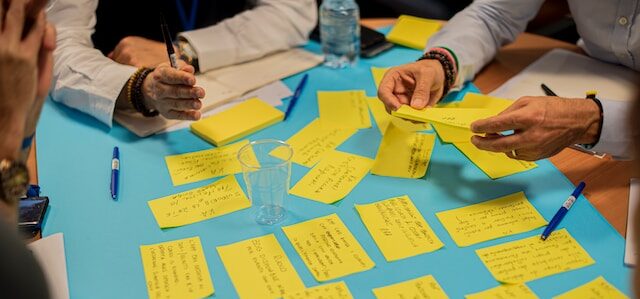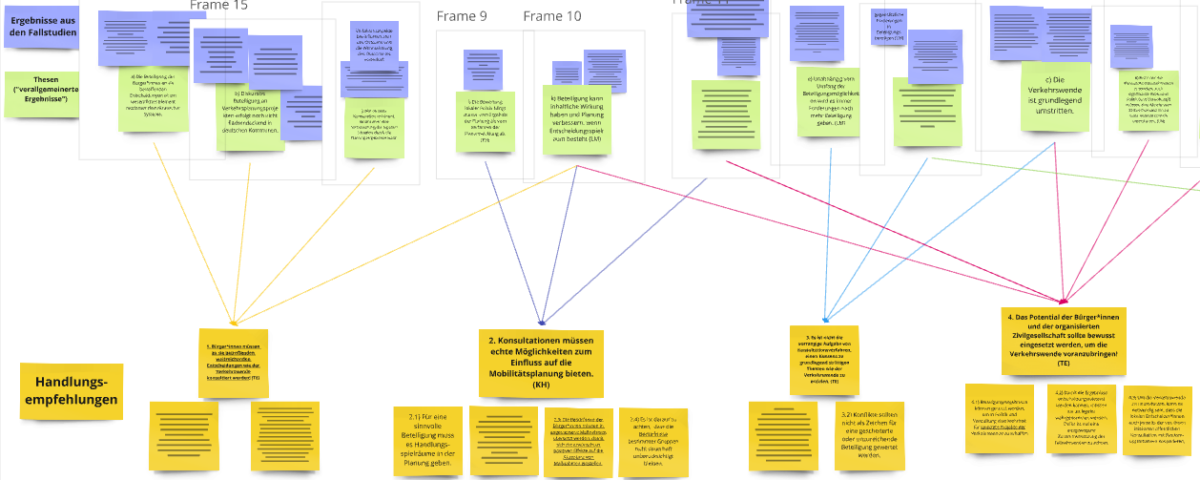tbc
Tag: legitimacy
Results of our surveys in Marburg (MoVe 35): Final presentation
As part of a joint digital exchange with the city administration of the city of Marburg (including citizen participation and transport planning) on September 25, 2024, the research group presented the results of the surveys in connection with the participation process for the MoVe 35 mobility and transport concept. The MoVe 35 project was one of a total of five planning projects that were intensively investigated by the CIMT research group over several years in order to examine the effects of consultative citizen participation on political attitudes, among other things.
Various participation formats were carried out as part of the planning process, e.g. an online survey, workshops, a project advisory board and an online dialog on public transport. A (council) referendum was also held in connection with the mobility concept. Further information on the MoVe 35 project and the participation formats used can be found on the city of Marburg’s website.
This planning and participation process was examined by the CIMT research group at Heinrich Heine University Düsseldorf independently (i.e. without being commissioned or influenced by the city of Marburg), primarily with the help of surveys of Marburg residents. For this purpose, a randomly selected part of the population in Marburg was surveyed in 2021 and 2024. Further information on the research group’s surveys can be found here.
Selected results
- As in all of our project areas, transport policy and the transport transition are conflicting issues. In Marburg, however, there is a particularly clear contrast between the educational groups. For example, the majority of people without a high school diploma reject the idea of reducing space for car traffic in the future, while almost half of those with a high school diploma can imagine doing so.
- Supporters and opponents of the mobility transition were similarly represented in the participation process. It was noticeable that an above-average number of car drivers took part in Marburg.
- The measures envisaged as part of Move 35 are viewed positively by the majority of people with high education in order to achieve the goals of sustainable mobility – in contrast to people without high education.
- The very different assessments of the two educational groups are also evident in the (planned) voting behavior for the referendum on halving car traffic: the majority of people with high education are in favor, the majority of people with low education are against, and participants in the consultation process are divided.
- Although satisfaction with the local institutions (mayor, city administration, council) was slightly better overall than in other project areas, it deteriorated significantly between 2021 and 2024 among people with low education.
- The information on the participation process reached a large part of the population. Nevertheless, it was mainly highly educated middle-aged men who took part – typical of consultative participation. It had a relatively large impact on citizens’ satisfaction with the mayor, administration and council. As expected, people who welcome the measures of MoVe 35 tend to be more satisfied, while those who reject the measures express greater dissatisfaction.
Download presentation
A prepared form of the results presentation can be downloaded here:
Results of our surveys in Offenburg (OG 2035): Final presentation
In a joint meeting with representatives from the city of Offenburg’s urban development and transport planning departments on October 11, 2024, the research group presented the results of the surveys conducted in connection with the participation process for the OG 2035 Transport Master Plan. The Transport Master Plan OG 20235 was one of a total of five planning projects that the CIMT research group studied intensively over several years in order to investigate the effects of consultative citizen participation on political attitudes, among other things.
Various formats were carried out as part of the planning process, e.g. online dialogs, workshops, local forums, youth participation and the establishment of pop-up measures. Further information on the OG 2035 project and the participation formats carried out can be found on the City of Offenburg website.
This planning and participation process was examined by the CIMT research group at Heinrich Heine University Düsseldorf independently (i.e. without being commissioned or influenced by the city of Offenburg), primarily with the help of surveys of Offenburg residents. For this purpose, a randomly selected part of the population in Offenburg was surveyed in 2021 and 2023. Further information on the research group’s surveys can be found here.
Selected results
- Transport policy and the transport transition are conflicting issues in Offenburg – just like in all other project areas examined. All opinions were represented in the participation process, although those in favor of the mobility transition were somewhat stronger and car users were also less common.
- Satisfaction with the local institutions (mayor, city administration, council) is rather average overall (and slightly worse than in other project areas) and deteriorated significantly from 2021 to 2023 in particular.
- The transport measures adopted as part of the OG 2035 master plan do not satisfy all interests, but overall only a minority (20-25%) are really against them. People who took part in the participation process rate the results more positively overall.
- As with most open participation formats, the participants are not representative of the population. They are mainly people with a high school diploma, middle-aged people and men.
- The participation process had a (comparatively low) and overall negative influence on satisfaction with local politics and administration, whereby the city administration was rated more positively than the mayor and council, especially by the consultation participants. As expected, people who welcome the measures of OG 2035 tend to be more satisfied, while those who reject the measures express greater dissatisfaction.
Download presentation
Results of our surveys in Marburg (MoVe 35): Final presentation
As part of a joint digital exchange with the city administration of the city of Marburg (including citizen participation and transport planning) on September 25, 2024, the research group presented the results of the surveys in connection with the participation process for the MoVe 35 mobility and transport concept. The MoVe 35 project was one of a total of five planning projects that were intensively investigated by the CIMT research group over several years in order to examine the effects of consultative citizen participation on political attitudes, among other things.
Various participation formats were carried out as part of the planning process, e.g. an online survey, workshops, a project advisory board and an online dialog on public transport. A (council) referendum was also held in connection with the mobility concept. Further information on the MoVe 35 project and the participation formats used can be found on the city of Marburg’s website.
This planning and participation process was examined by the CIMT research group at Heinrich Heine University Düsseldorf independently (i.e. without being commissioned or influenced by the city of Marburg), primarily with the help of surveys of Marburg residents. For this purpose, a randomly selected part of the population in Marburg was surveyed in 2021 and 2024. Further information on the research group’s surveys can be found here.
Selected results
- As in all of our project areas, transport policy and the transport transition are conflicting issues. In Marburg, however, there is a particularly clear contrast between the educational groups. For example, the majority of people without a high school diploma reject the idea of reducing space for car traffic in the future, while almost half of those with a high school diploma can imagine doing so.
- Supporters and opponents of the mobility transition were similarly represented in the participation process. It was noticeable that an above-average number of car drivers took part in Marburg.
- The measures envisaged as part of Move 35 are viewed positively by the majority of people with high education in order to achieve the goals of sustainable mobility – in contrast to people without high education.
- The very different assessments of the two educational groups are also evident in the (planned) voting behavior for the referendum on halving car traffic: the majority of people with high education are in favor, the majority of people with low education are against, and participants in the consultation process are divided.
- Although satisfaction with the local institutions (mayor, city administration, council) was slightly better overall than in other project areas, it deteriorated significantly between 2021 and 2024 among people with low education.
- The information on the participation process reached a large part of the population. Nevertheless, it was mainly highly educated middle-aged men who took part – typical of consultative participation. It had a relatively large impact on citizens’ satisfaction with the mayor, administration and council. As expected, people who welcome the measures of MoVe 35 tend to be more satisfied, while those who reject the measures express greater dissatisfaction.
Download presentation
A prepared form of the results presentation can be downloaded here:
Further Development: Recommendations for Action in the Use of Consultation for Mobility Transitions
In a presentation at the Dortmund Conference (dokorp) 2025 “Reasons for planning in time of multiple crisis”, Katharina Holec, Laura Mark and Tobias Escher presented further selected recommendations for dealing with planning conflicts in the context of the transport transition. The presentation arose from the ongoing work on recommendations for action, which was developed by the CIMT research group as a synthesis of the various strands of research and in cooperation with practitioners.
These recommendations are derived from various research findings from the CIMT project. They are based on quantitative data from surveys of more than 2,000 people and qualitative data from more than 20 interviews on various mobility planning processes in three German cities, as well as a quantitative analysis of the participation landscape in Germany based on an extensive database of over 350 transport-related participation processes that we have built up. Following feedback from practitioners, they were revised and put into a coherent form.
Recommendations
For the presentation, the following two recommendations were selected from those developed to date and presented for discussion:
It is not the primary task of consultation processes to reach a consensus on fundamentally controversial issues such as the mobility transition.
Compared to the presentation at the CMUS conference in Aalborg, this recommendation was slightly adapted and reformulated in the process of developing the recommendations for action, so that consensus is still not seen as the primary task of consultation procedures, but can at least be sought as a partial aspect. Furthermore, it is emphasized that the transport transition is fundamentally controversial. The derivation of the recommendations for action can be found in the contribution to the Mobilities Controversies Conference in Aalborg 2024.
The results of the consultation must be supplemented by other perspectives in order to arrive at a balanced decision in the interests of the mobility transition!
Here, too, the wording was slightly adapted after discussion with practitioners. The wording was changed primarily to make it clear once again that decisions should primarily be made in the interests of the mobility transition and that these should also be balanced for different socio-economic groups.
Presentation and publication
We are currently working on a compilation of these and other empirically based recommendations for the use of participation in the mobility transition.
5th workshop for practitioners on recommendations for action generated from the results
On October 31, November 7 and December 11, workshops for practitioners were held at which we presented recommendations for action and discussed them with the participants. The participants were administrative staff responsible for citizen participation in the various municipalities with which we cooperated and who were involved in the planning and implementation of the participation processes that we examined in our research.
In the course of our investigation of various open consultative participation formats on the topic of urban mobility planning, we were able to generate various findings from which theses can be derived. In a further step, we combined these numerous theses into seven recommendations for action, which are intended to support the implementation of consultative participation formats. At the beginning of the workshops, we used an example to outline the path from insight to recommendations for action before the practitioners themselves got involved and were able to leave comments in our mind map. With the help of digital sticky notes, they added their opinions, additions, criticisms and experiences to the individual recommendations for action. This was followed by discussions on individual recommendations for action. Important points were:
- The usefulness of the recommendations for action in participation practice as tools for classifying one’s own participation
- The usefulness of the recommendations for action in participation practice as an aid to justifying the importance of participation
Overall, the experts agreed that the results of our research are very helpful in communicating the challenges of citizen participation and the resulting consequences to policymakers. In addition, many of the practitioners noted that they found the link to the results of the research clear and structured. Some had the impression that participation and specific consultations are viewed critically in municipal administrations. They share the view that our results can help to train administrative staff and make them aware of the usefulness of participation procedures.
Major points of discussion in the workshops were
- the specificity of the recommendations for action and the inclusion of examples in the presentation of results
- a potentially stronger emphasis on the transparency aspect through the recommendations for action
- an arrangement of the recommendations for action in the chronological order of a participation process
The planners note that the recommendations for action could be made more specific in order to clarify their practical relevance and make them more likely to be applied. In the form in which they were presented, they were rather general and always in strict relation to the results of the research. It was suggested that the recommendations be underpinned with examples from specific participation formats. For example, our research objects could be mentioned, which form the basis of our findings, the theses and thus also the recommendations for action.
Although reformulations and concretizations have been made, examples cannot be found directly in the recommendations. This would have been complicated, especially with regard to the partly abstract quantitative results. However, some examples from the specific participation processes form the basis for the development of the recommendations for action and are sometimes used to underline their importance.
Another aspect that the experts raised is that different tasks and questions arise at different times in a planning process. Some of the seven recommendations for action relate to the planning, implementation or evaluation of the procedures. It was suggested that specific attention should be paid to the participation process and that the recommendations be arranged according to the different stages. This was implemented in the order of the recommendations.
At the end of the workshops, we asked for suggestions for the publication of the results. It was emphasized how important it is for the planners to be able to find these recommendations easily and it was recommended to use existing networks in order to disseminate the results as widely as possible.
We would like to thank the practitioners for their time and important input – and to a large extent for their years of cooperation. We gained many important insights and suggestions that will help us in our work on a helpful and practical publication of recommendations for action.
Addressing Mobilities Controversies through Public Participation?
In a presentation at the C-MUS Congress 2024 in Aalborg (Denmark), Katharina Holec, Laura Mark and Tobias Escher presented selected recommendations for managing planning conflicts in the context of the transport transition.
These recommendations are derived from various research findings from the CIMT project. They are based on quantitative data from surveys of more than 2,000 people and qualitative data from more than 20 interviews on various mobility planning processes in three German cities, as well as a quantitative analysis of the participation landscape in Germany based on an extensive database of over 350 transport-related participation processes that we have compiled.
Recommendations
For the presentation, the following two recommendations were selected from those developed to date and presented for discussion:
It is not the role of a consultation to reach a consensus!
This is derived from the fundamentally conflictual nature of transport planning, which is also reflected in our data and could not be satisfactorily resolved by the participation formats analysed. For example, in the freiRaum Ottensen project, despite extensive participation, 21% of participants were still dissatisfied with the decision made, and 74% of the population were not even aware of the opportunity to participate. This means that the aim should not be to resolve conflicts, but to create a forum for dialogue and the generation of ideas, and that participation should not be judged by the degree of conflict resolution.
Consultation results must be complemented with other perspectives in order to come to a balanced decision!
Participation results can provide a picture of existing concerns and should be taken seriously, but firstly they do not reflect the general mood of the population due to their lack of representativeness, and secondly it cannot be assumed that all important aspects for the mobility transition are included or that mainly supportive contributions are made. This means that consultations should be supplemented by other forms of participation. Participation results should be supplemented and weighed up with other perspectives from different stakeholder spheres and cannot replace a bold political decision.
Presentation and publication
We are currently working on a compilation of these and other empirically based recommendations for the use of participation in the transport transition. This publication will be linked here once it has been finalised. The presentation can be downloaded here:
Acceptance for transformation projects through public participation? A plea for more realism
In this article in the eNewsletter Netzwerk Bürgerbeteiligung, Tobias Escher, Katharina Holec and Laura Mark make the argument for a more realistic view of the role of citizen participation in the sustainability transformation. Based on four theses, they explain that conflict resolution – even though this is often associated with participation – does not do justice to the role of public consultations, but that consultations are nevertheless indispensable in the political shaping of transformation.
Summary
The article puts forward a total of four theses, each of which is supported by findings from the research of the CIMT project. These are as follows:
- Thesis 1: Citizen participation can lead to mutual understanding, but generally not to a consensus on fundamental conflicts of interest.
- Thesis 2: Citizen participation provides an insight into existing interests and concerns, but not a representative impression of public opinion
- Thesis 3: The results of participation do not guarantee support for sustainable transformation measures.
- Thesis 4: Citizen participation is a support, but not a substitute for political decisions.
However, this does not imply that citizen participation can be dispensed with! Instead, good participation can provide support by giving information and thus, for example, overcome resistance that is primarily based on a lack of knowledge. It also uses local knowledge to recognise problems and develop new ideas where necessary. Finally, it provides a forum in which wishes and concerns can be expressed and arguments exchanged. This can lead to less protest. It can help to identify lines of conflict more clearly and to better understand the causes of conflicts. Citizen participation can thus contribute to dealing with the conflicts inherent in the transformation, but it will not usually resolve them. Last but not least, citizen participation remains a democratic imperative, as citizens should be able to shape far-reaching decisions.
Publication
Escher, Tobias; Holec, Katharina; Mark, Laura (2024): Akzeptanz für Transformationsprojekte durch Bürgerbeteiligung? Ein Plädoyer für mehr Realismus. Hg. v. Stiftung Mitarbeit. Bonn (eNewsletter Netzwerk Bürgerbeteiligung, 02/2024). Online verfügbar hier.
Results of our research in Hamburg-Ottensen (freiRaum Ottensen): Final presentation
In a joint meeting with representatives of the district office Altona in Hamburg on 7 December 2023, the research group presented the results of the data collection in connection with the freiRaum Ottensen project. FreiRaum Ottensen was one of the five projects in which surveys and interviews were conducted. The focus was on the public consultations in which the general public was able to participate. More information on the project freiRaum Ottensen and the participation formats carried out can be found here.
Selected results
- The population in Ottensen largely perceives a need for improvement in transport and is relatively positive about the transport transition overall.
- Around 50% of the population have heard about the participation process for freiRaum Ottensen, and around 16% have taken part. In comparison with other processes, these are relatively high figures, although the usual over-representation of people with high school diploma, men and older people can be seen despite a wide varieties of participation formats offered to different target groups.
- The discussion during the different participation formats was perceived as constructive and respectful, although conflicts and gaps in the representation of all interests were acknowledged.
- In this project, the policy process was comparatively open to citizens and participants were able to shape the content of the planning outcome.
- For around a third of the population and half of the participants, the participation process had an influence on their satisfaction with the district authority. However, this influence was not always positive: for example, one in four participants was more satisfied with the district authority at the end, but just as many reported less satisfaction.
- Two thirds of the population rated the adopted measures as positive.
- (Statements on the population generally refer to the subgroup of people with a high school diploma – see detailed information on the representativeness of the surveys)
Download
Pushback for the municipal mobility transition? Joint closing event of SÖF Junior Research Groups CIMT and MoveMe on 26th April 2024
The two junior research groups in Social-Ecological Research CIMT and MoveMe held a joint final event showcasing some results of their research into the transition to sustainable mobility. The event took place online on 26. April 2024. More information is available in German.





